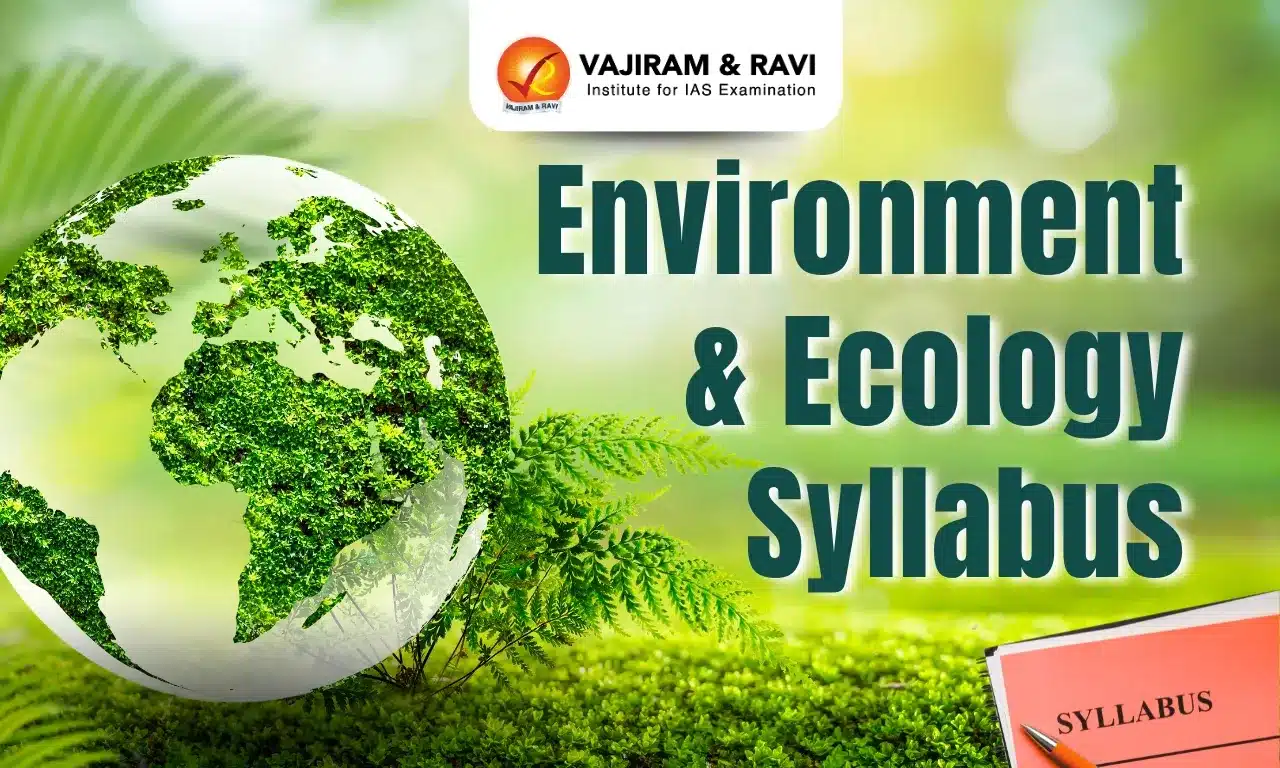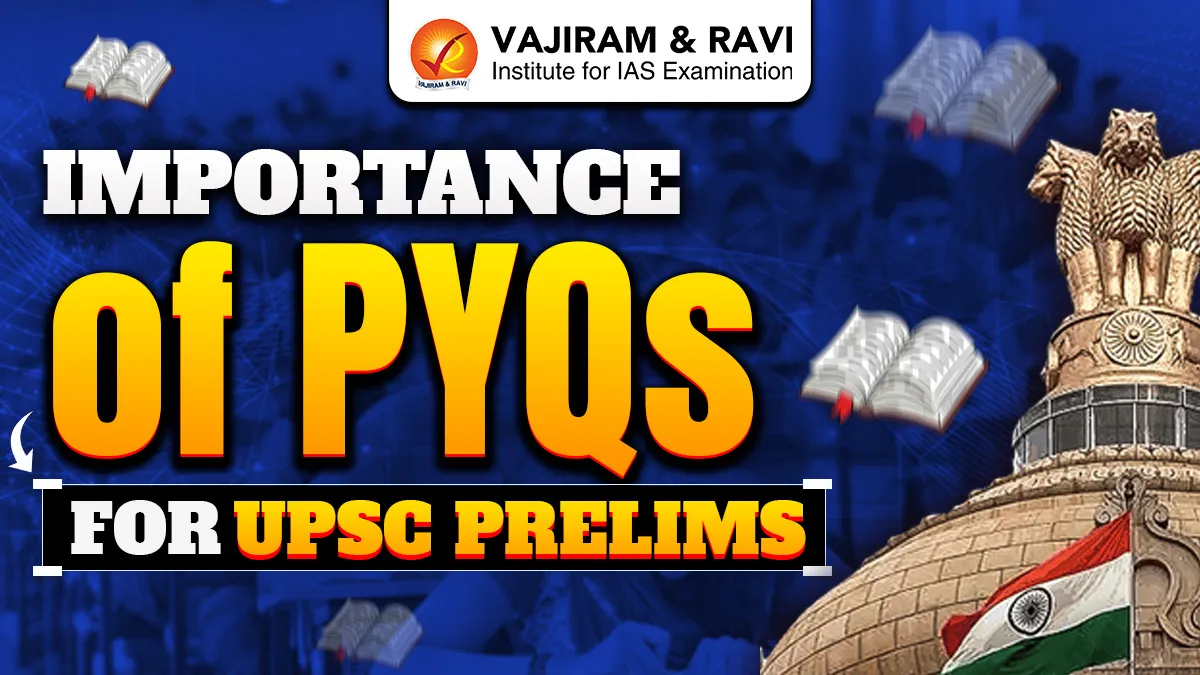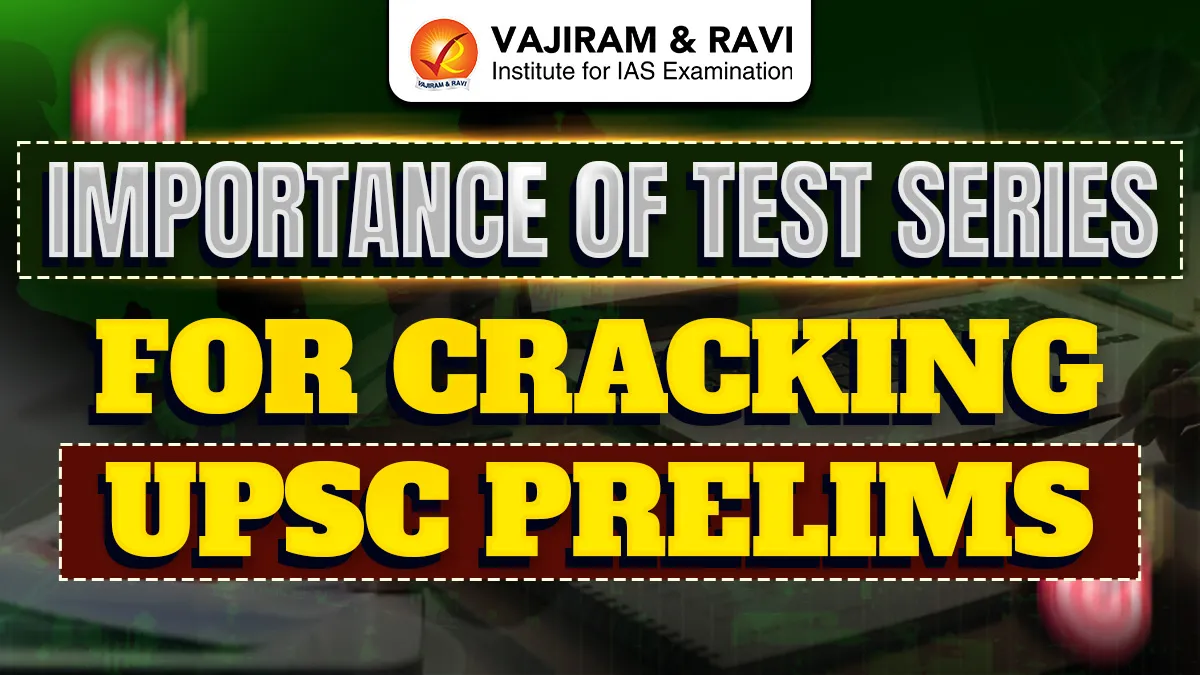UPSC Prelims Environment and Ecology syllabus includes important concepts like environment, biodiversity and ecological systems. Topics like ecosystems, climate change and its conservation and national and international environmental laws. To qualify UPSC Civil Services Examination, one should be well aware about these concepts.
UPSC Prelims Environment and Ecology Syllabus 2025
While the UPSC Prelims syllabus does not provide detailed subtopics under Environment and Ecology, a general outline can be derived based on previous years’ questions and themes. The following areas are considered important:
- Ecology:Basic concepts related to ecosystems, their structure and function, biotic and abiotic components, food chains, food webs, and ecological interactions.
- Biodiversity: Types and levels of biodiversity, biodiversity hotspots, endangered and endemic species, conservation efforts, and key international conventions (e.g., CBD, CITES).
- Climate Change:Causes and consequences of climate change, mitigation and adaptation strategies, and global initiatives like the Paris Agreement and IPCC reports.
- Environmental Pollution: Types of pollution—air, water, soil, and noise—their sources, impacts, and control measures including national programmes and pollution control boards.
- Environmental Degradation:Issues such as deforestation, land degradation, desertification, and soil erosion, along with their ecological and socio-economic impacts.
- Conservation Efforts:Protected areas including biosphere reserves, national parks, wildlife sanctuaries, and community reserves; in-situ and ex-situ conservation methods.
- Environmental Laws and Policies:Overview of major environmental legislations (e.g., Environment Protection Act, Forest Conservation Act), national policies, and regulatory institutions.
- Sustainable Development:Principles of sustainable development, Sustainable Development Goals (SDGs), and the role of stakeholders in promoting environmental sustainability.
- Environmental Movements:Important environmental movements and campaigns in India and globally, including their objectives, leadership, and outcomes.
- Current Affairs:Recent developments, national and international reports, government initiatives, and emerging issues related to environment and ecology.
UPSC Prelims Environment and Ecology Topic Wise Syllabus 2025
The table below contains the detailed UPSC Environment and Ecology Syllabus to prepare for 2025:
|
Part I: Environment and Ecology |
||
|
1. Basics of Environment and Ecology |
|
|
|
2. Ecosystem |
|
|
|
3. Biogeochemical Cycles |
|
|
|
4. Pollution and Degradation |
|
|
|
5. Environmental Issues |
|
|
|
6. Environment Impact Assessment |
|
|
|
7. Population Ecology |
|
|
|
8. Waste Management |
|
|
|
Part II: Biodiversity |
||
|
1. Basics of Biodiversity |
|
|
|
2. Indian Biodiversity |
|
|
|
3. Biodiversity Conservation Initiatives |
|
|
|
4. Conservation Efforts |
|
|
|
Part III: Climate Change |
||
|
1. Basic Understandings |
|
|
|
2. India and Climate Change |
|
|
|
3. Climate Change Organizations |
|
|
|
Part IV: Agriculture |
||
|
Agriculture |
|
|
|
Part V: Miscellaneous |
||
|
1. Acts and Policies |
|
|
|
2. Environmental Organisations |
|
|
|
3. Environmental Conventions: |
|
|
|
4. Other Facts |
|
|
Environment Questions in UPSC Prelims
The environment and ecology questions constitute a major portion in UPSC Prelims . Here is an analysis of Environment and Ecology Questions over the years:
Environment and Ecology questions in the UPSC Prelims have been a significant part of the exam in recent years. Here are the number of Environment and Ecology questions in the past few years:
|
UPSC Prelims Year |
Number of Questions |
|
2024 |
15 |
|
2023 |
10 |
|
2022 |
12 |
|
2021 |
20 |
|
2020 |
22 |
|
2019 |
21 |
|
2018 |
17 |
|
2017 |
15 |
UPSC Prelims Environment and Ecology Syllabus 2025 Important Books
To effectively prepare for the Environment and Ecology section of the UPSC Prelims 2025, it is crucial to refer to reliable and comprehensible resources. The right study material will help you build a strong conceptual understanding of key topics such as ecosystems, biodiversity, climate change, environmental laws, and sustainable development.
Below is a list of recommended books that comprehensively cover the syllabus and are well-suited for aspirants aiming for conceptual clarity and exam-oriented preparation.
- Science NCERT: Class 6 to 10 (Environment Related Topics)
- Biology NCERT: Class 12 (Environment Related Topics)
- Geography NCERT: Class 6 to 11 (Environment Related Topics)
- Environment and Ecology – By Vaishali Anand
| Other Related UPSC Optional Syllabus | ||
|---|---|---|
|
UPSC Animal Husbandry & Veterinary Science Optional Syllabus |
|
|
Last updated on February, 2026
→ UPSC Notification 2026 is now out on the official website at upsconline.nic.in.
→ UPSC IFoS Notification 2026 is now out on the official website at upsconline.nic.in.
→ UPSC Calendar 2026 has been released.
→ Check out the latest UPSC Syllabus 2026 here.
→ Join Vajiram & Ravi’s Interview Guidance Programme for expert help to crack your final UPSC stage.
→ UPSC Mains Result 2025 is now out.
→ UPSC Prelims 2026 will be conducted on 24th May, 2026 & UPSC Mains 2026 will be conducted on 21st August 2026.
→ The UPSC Selection Process is of 3 stages-Prelims, Mains and Interview.
→ Prepare effectively with Vajiram & Ravi’s UPSC Prelims Test Series 2026 featuring full-length mock tests, detailed solutions, and performance analysis.
→ Enroll in Vajiram & Ravi’s UPSC Mains Test Series 2026 for structured answer writing practice, expert evaluation, and exam-oriented feedback.
→ Join Vajiram & Ravi’s Best UPSC Mentorship Program for personalized guidance, strategy planning, and one-to-one support from experienced mentors.
→ UPSC Result 2024 is released with latest UPSC Marksheet 2024. Check Now!
→ UPSC Toppers List 2024 is released now. Shakti Dubey is UPSC AIR 1 2024 Topper.
→ Also check Best UPSC Coaching in India
UPSC Prelims Environment and Ecology Syllabus FAQs
Q1. What is the syllabus of Ecology and Environment in UPSC?+
Q2. How to study Environment and Ecology for UPSC Prelims?+
Q3. What is the weightage of Environment and Ecology in UPSC Prelims?+
Q4. Which is the hardest subject in UPSC Prelims?+
Q5. Which subject has the shortest syllabus in UPSC?+

















